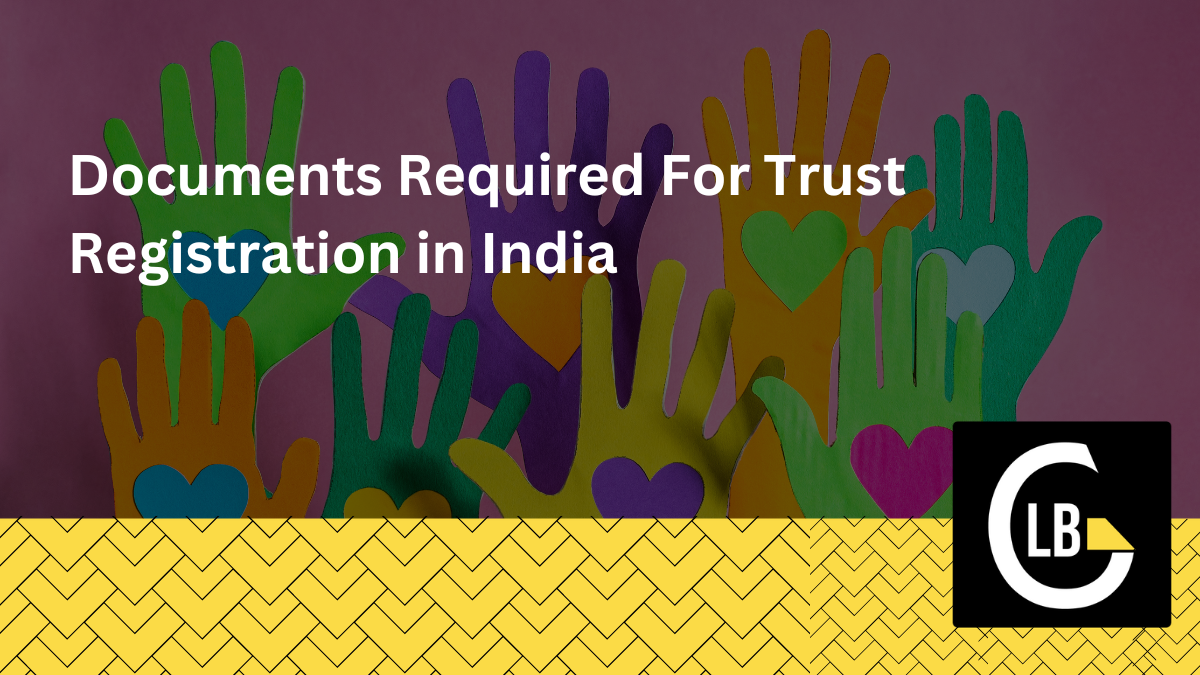If you’re planning to set up a trust in India for charitable, educational, social, or religious purposes, it’s essential to legally register it. Registering a trust provides it with official recognition and enables you to receive benefits such as tax exemptions and property ownership. To help you through the process, we’ve compiled a list of documents required for trust registration and explained the steps involved.
What is a Trust?
A trust is a legal arrangement where one or more individuals (known as trustees) manage assets or property on behalf of beneficiaries. The person who creates the trust is called the settlor. Trusts can be either private, benefiting specific individuals, or public, which work for the welfare of society at large, like charitable trusts.
What is Trust Registration?
Trust registration is the legal process through which a trust is formally established and recognized under the law. A trust is an arrangement in which one party, known as the trustee, holds and manages assets (such as property or money) for the benefit of another party, called the beneficiary. Trusts can be set up for various purposes, including charitable, religious, or private family matters.
Why Should You Register a Trust?
Registering your trust is important because it makes it a legal entity. Here are the key benefits of registering a trust:
- Legal protection: Once registered, the trust becomes an official legal entity.
- Tax advantages: Charitable trusts can apply for tax exemptions under certain sections of the Income Tax Act.
- Asset ownership: A registered trust can legally own property and manage assets.
- Increased accountability: Registration improves trustworthiness, allowing transparency in operations.
Documents Needed for Trust Registration
When you decide to register your trust, you’ll need to submit several documents to the Registrar of Trusts. Here are the important documents you need to prepare:
1. Trust Deed
The trust deed is the core document that outlines the rules and structure of the trust. It includes:
- The name of the trust
- The address of the trust’s office
- Names and addresses of the trustees
- Details of the settlor
- Objectives of the trust
- Rules for managing the trust and the responsibilities of trustees
The trust deed must be prepared on non-judicial stamp paper, and the stamp duty amount varies by state. All trustees should sign this document.
2. ID Proof of Trustees and Settlor
Each trustee and the settlor must submit identity proof. Commonly accepted ID proofs include:
- Aadhar card
- Passport
- Voter ID
- Driving license
Ensure these documents are valid and up to date.
3. Address Proof of Trustees and Settlor
You’ll also need to provide proof of address for the trustees and the settlor. This can be:
- Aadhar card
- Utility bill (electricity, water, or gas)
- Passport
- Rent agreement, if applicable
4. Proof of Registered Office Address
You must submit proof of the address where the trust will operate. If you own the property, submit the ownership documents. If it’s rented, provide a rent agreement along with a No Objection Certificate (NOC) from the landlord.
5. Photographs of Trustees and Settlor
Recent passport-sized photographs of the trustees and settlor must be submitted for identification purposes.
6. PAN Card of Trustees and Settlor
Copies of the PAN card of the trustees and settlor are required for tax purposes.
7. PAN Card for the Trust
After registration, you’ll need to apply for a PAN card in the name of the trust. This is necessary for opening a bank account and filing tax returns for the trust.
8. Resolution by Trustees
In some cases, you might be required to submit a resolution signed by all trustees. This document confirms their decision to form the trust and provides details of their role in its operation.
Step-by-Step Process for Trust Registration in India
Once you’ve gathered the required documents, you can proceed with registering your trust. Here’s a breakdown of the registration process:
1. Prepare the Trust Deed
The first step is drafting the trust deed, which outlines the purpose and functioning of the trust. You may want to seek legal assistance to ensure everything is properly structured.
2. Submit the Documents to the Registrar
Take the trust deed and other required documents to the Registrar of Trusts in your area. You will also need to pay a registration fee, which varies from state to state.
3. Sign the Trust Deed
The trust deed must be signed by the settlor and trustees in the presence of two witnesses. The signatures should be done on non-judicial stamp paper.
4. Verification by the Registrar
Once submitted, the Registrar will verify all the documents and may ask for clarification if needed. Once everything is confirmed, the registration will be completed.
5. Receive the Trust Registration Certificate
After the verification is successful, the trust will be registered, and you will receive a registration certificate, which officially recognizes the trust as a legal entity.
Conclusion
Trust registration in India is a straightforward process as long as you have the right documents ready. By following the steps outlined in this guide, you can ensure a smooth registration and start operating your trust legally. A registered trust not only brings legal protection but also boosts credibility when working with beneficiaries and donors.
